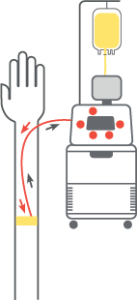Donating Platelets
What are platelets?
Platelets are golden! They are blood cells that help control bleeding by collecting at the site of an injury and helping the blood clot. They are especially needed for cancer treatments, traumatic injuries, organ and bone marrow transplants, open heart surgeries, and bleeding disorders.
You can safety donate platelets as often as every 7 days, up to 24 times a year. * Most platelet donations help 2-3 patients! Schedule your platelet donation today at a Bloodworks center near you.
*Platelet donation frequency varies depending on whole blood donation frequency and history.
Help out today!
Want to earn awesome rewards every time you donate platelets?
Join the Power Platelets Rewards Program!
Platelet Donation 101
Who needs platelets

CHEMO PATIENT:
5-100 UNITS
OPEN HEART SURGERY:
6 UNITS
BURN
PATIENT:
20 UNITS
ORGAN TRANSPLANT:
30 UNITS
BONE MARROW TRANSPLANT:
120 UNITS
The ideal platelet donor

Healthy
Weigh at least 114lbs.
No aspirin for 48 hrs.
High platelet count
If you have A+, B+, AB+, or O+ blood type, your blood will have the greatest impact when you donate platelets. If you meet the above requirements for giving blood, then you can usually donate platelets.
We will check your platelet count to see if platelet donation is right for you.
The ideal platelet donor

Healthy
Weigh at least 114lbs.
No aspirin for 48 hrs.
High platelet count
If you have A+, B+, AB+, or O+ blood type, your blood will have the greatest impact when you donate platelets. If you meet the above requirements for giving blood, then you can usually donate platelets.
We will check your platelet count to see if platelet donation is right for you.
Adequate supply for patients

Platelets can only be stored for 5-7 days. It is critical that we provide a constant, steady supply for patients in our community and this can only be achieved by donors who donate frequently. You can safety donate platelets as often as every 7 days, up to 24 times a year.
The platelet donation process


Through a process called apheresis, blood is drawn from your arm to a sterile, one-use-only kit in an apheresis machine that spins the blood to remove just the platelets, returning the red cells and plasma to your arm. This process takes about seventy minutes to two hours while you read or stream movies. We appreciate your time, and your community appreciates your donation.

Platelet Donation FAQ
Why is there always a need for platelets?
Platelets are best stored at room temperature and have a shelf life of only 5-7 days—compared with refrigerated red cells that can be stored for 42 days, and plasma frozen for up to a year. That’s why platelet donations are always needed, every day. Their limited storage life means that we must continuously collect new platelets to meet patient needs. Thankfully, platelets can be donated every 7 days, up to 24 times a year.
How do I find out my platelet count and become a platelet donor?
You can request a platelet count at your next whole blood donation. With each platelet donation, we will continue to access your platelet count to ensure you’re still a good candidate and to maximize your donation to help the most patients. If your platelet count after the first donation is too low or too high, we will notify you.
How can I make my donation successful?
- Eat higher calcium food before donating (like yogurt).
- Drink extra fluids and eat a healthy meal before donating.
- Do not take aspirin or products containing aspirin 48 hours prior to donation.
- Show up a few minutes early.
- Make sure you use the restroom prior to your donation.
- If you need to reschedule, we appreciate at least 48-72 hours’ notice so we can fill your appointment time with another donor.
What does platelet donation feel like?
Most people say they only feel a slight pinch from the needle at the start of the donation. Because of the apheresis process, your red cells are returned to your body along with an anticoagulant that may cause some lip tingling, so we offer you Tums® since calcium diminishes that effect. That’s also why we encourage donors to eat higher calcium food before donating (like yogurt). Some people say they feel refreshed after donating because of the extra fluid.
How long does it take to donate platelets?
Depending on your weight and height, an apheresis donation process will take approximately 70 minutes to two hours—the perfect amount of time to read, stream a movie, listen to music, have a conversation with the staff, or simply enjoy the quiet.
How will I feel after my platelet donation?
Most donors feel fine after donating blood or platelets, but some donors may experience an upset stomach, feel faint or dizzy, or have bruising, redness, or pain where the needle was inserted. Since your oxygen-carrying red cells are returned in the apheresis process, you should feel less tired than after a whole blood donation. Take it as an opportunity to “be kind to yourself” since you are saving patients’ lives!
Can I also donate whole blood?
Because donation eligibility criteria are the same for both platelet and whole blood donors, you can donate platelets 7 days after donating whole blood, or you can donate whole blood 7 days after donating platelets. Our team at 800-398-7888 is happy to put together an ideal donation schedule with you.
How long before my body replaces the donated platelets?
Because of the apheresis process, your plasma and red blood cells are returned to your body during your donation. Your platelets are the only component removed, which will take about 2 days for your body to replace.
That’s why you can donate platelets so frequently— every 7 days, up to 24 times a year!
What are the best days to donate platelets?
Because the need for platelets is continuous, the best day to donate platelets is whenever it fits into your schedule. However, our hospitals typically use more platelets in the beginning of the week so donations on Fridays, Saturdays, Sundays, and Mondays are very appreciated.



